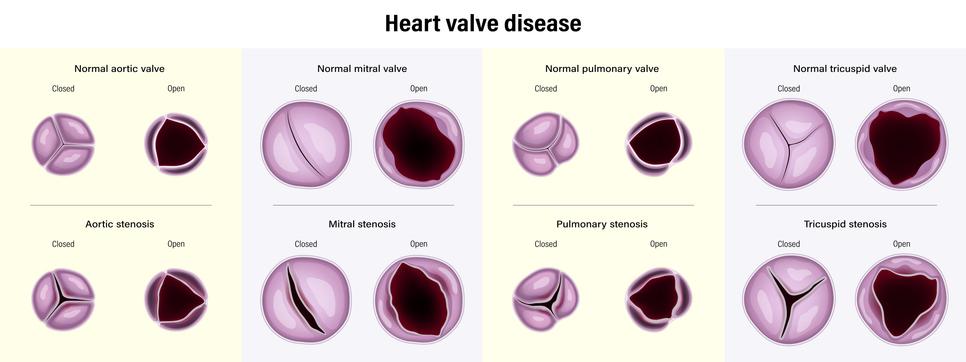
Roughly 25,000 Americans die each year from valvular heart disease, but researchers from Rutgers Health and other institutions conclude that new technology could soon help doctors slash that number. Image courtesy: Getty Images
April 1, 2024 — Roughly 25,000 Americans die each year from valvular heart disease, but researchers from Rutgers Health and other institutions conclude that new technology could soon help doctors slash that number.
“We are witnessing a paradigm shift in how valvular heart diseases are diagnosed and treated,” said Partho Sengupta, Henry Rutgers Professor of Cardiology and chief of the Division of Cardiovascular Disease and Hypertension at Rutgers Robert Wood Johnson Medical School.
Sengupta, who is also Chief of Cardiology at Robert Wood Johnson University Hospital, an RWJBarnabas Health facility, is the lead author of a paper in The Lancet explaining which technologies are here now and which are coming soon. “It will be important that we learn and embrace the winds of change that are imminent.”
What is Valvular Heart Disease?
Valvular heart disease, a condition in which any of the heart’s four valves are damaged or diseased, afflicts 2.5 percent of all Americans and 13 percent of Americans over age 80. Most cases go undiagnosed until the condition advances enough to create symptoms such as shortness of breath, chest pain or fatigue. Earlier detection can extend the quality of life with treatments designed to prevent progression.
Physicians have traditionally detected valvular heart disease simply by listening through a stethoscope, but new technologies can improve diagnosis. Studies show that AI can detect infrasonic heart murmurs at frequencies too low for human ears to hear. Moreover, electrocardiograms, which record the electrical activity of the heart, and wearable devices can provide artificial intelligence (AI) the data it needs to spot possible cases of valvular heart disease via fluctuations in heart rate, blood pressure, blood oxygenation and other factors. Such devices could not only detect early disease but also monitor disease progression after diagnosis, the researchers wrote.
Early Diagnosis
Primary care doctors could also play a larger role in early diagnosis. Few of them currently have the equipment and expertise to diagnose valvular heart disease, but recent studies have demonstrated that healthcare professionals can use a combination of portable ultrasound devices and AI to diagnose heart diseases as well. Such technology could make valvular heart disease screenings part of routine checkups for high-risk patients.
AI algorithms could further improve care by using data from ultrasounds and other imaging devices to develop a digital twin of each patient. This digital twin can simulate how therapies and surgeries could work for each individual to improve precision in selecting each patient’s real-life treatments.
“The concepts I wrote in this paper also form the crux of what we are doing here at the Center for Innovation at Robert Wood Johnson University Hospital, an RWJBarnabas Health facility. Since opening in partnership with Rutgers Robert Wood Johnson Medical School in 2022, we have brought together clinicians, researchers and private industry to invent and develop innovative technologies,” said Sengupta, who leads the center, adding that he believes these innovations will not only aid early detection but also increase the understanding needed for developing new medical therapies.
Is There Medication for Valvular Heart Disease?
No medications are currently approved for the treatment of valvular heart disease, but ongoing trials aim to change that. Cholesterol may cause or exacerbate some types of valvular heart disease, so drug companies are testing statins and PSK9 inhibitors (which lower cholesterol even more than statins) against aortic stenosis.
Retrospective analysis of diabetes drug trials, moreover, has found that drugs in a class called DPP-4 inhibitors appeared to slow the progression of aortic stenosis, so prospective trials are underway for those medications, which seem to combat disease by maintaining nitric oxide levels around valve tissue. Rutgers and RWJBarnabas Health are currently offering these experimental therapies to patients as a site for a clinical trial testing a strategy for halting the progression of valve diseases long before surgeries are needed.
The paper underscores the progress in timely surgeries and transcatheter valve replacements, which have become a less invasive alternative to conventional surgery for certain patients because they do not require a large opening in the chest. However, the prosthetic valve tissue underperforms the body’s own valve tissue, and the difference increases with time because it cannot renew itself as the body ages. They break down in a way that functional tissue, which constantly rebuilds itself, never does.
There is, however, a new generation of more flexible prosthetics undergoing clinical trials that promise better performance. Researchers are developing resorbable valvular prostheses that the body will eventually replace with working organic valves, just as it constantly replaces existing tissue with new tissue as proteins wear out. These would be particularly valuable for younger patients, who will otherwise need several sets of replacement valves over the course of their lives.
“The innovation, discovery and future of clinical care that we have envisioned at Rutgers now find their way in The Lancet, and it’s heartening that this road map may also be incorporated globally in our fight against valvular heart disease,” said Sengupta, a Rutgers faculty physician and a member of the RWJBarnabas Health Medical Group.
Data to be presented at American College of Cardiology Scientific Session, ACC.24
Notably, physician-scientists from RWJBarnabas Health and Rutgers Health will present an extensive portfolio of innovative cardiovascular data from their clinical research program at the American College of Cardiology’s - ACC Annual Scientific Session & Expo, ACC.24, in Atlanta, Georgia on April 6 to 8, 2024. A total of 59 abstracts have been accepted, composed of data evaluating and educating on risk factors, treatment options and ongoing research advances to improve cardiovascular care and outcomes for patients.
“Being recognized as a leading academic institution having the most expansive collection of abstracts from New Jersey accepted at this year’s American College of Cardiology conference not only reflects the quality of research at RWJBarnabas Health, but also the passion and determination of our clinicians, researchers, and support staff. We are incredibly proud of this accomplishment and are committed to delivering the highest standard of care as we continue to strive to improve outcomes for our patients,” noted Sengupta.
For more information: www.rwjbh.org


 June 08, 2023
June 08, 2023 

